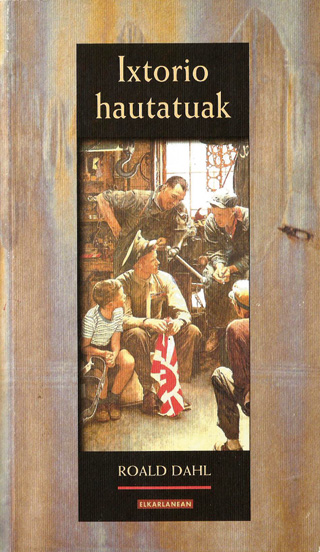

Roald Dahl was born a hundred years ago. But after the great celebrations, in our little one: we only have a collection for adults in Basque, a form of anthology, seven stories and a narrative that explains the paths to the writing of the author. The truth is, it's not much, but less is nothing. They're the ones he wrote for kids and young people, who made fame, who are already part of the collective imagination. On the contrary, even when he wrote for adults, he had children in mind. In The Man of Guardasola, who opens the collection, even more so in the story The Child who speaks with the animals that appear in the same title. It seems that in this birth to life the different intentions, behaviors and attitudes that will develop in adult life are delimited. In a short time, Dahl knew the germ that the war might have; “in the almost infinite capacity of the adolescents’ cruelty” shown in the Beltxarga story, –to bring here the words of Edorta Jiménez–.
All the narratives have a more thoughtful reading, as the finger at the Autostoplaria, the Auto-Stop, that steals the police from the fine they just put: “I never take anything off the losers. And the poor, either. I’m just going to those who have, that is, the winners and the rich.” And I don't know where the exact limit is, why these are right for adults, and those are children's and youth literature. I would like to say that I have also found those in this book, as José Luis Otamendi said in that remote 1996, “a literature that can like anyone and everyone.” “For the whole family.” So you count – there’s no text you don’t find any interest in – but also because of the way you count it. Correct, concrete, complete and detailed – “introduce many details. That’s the most important thing in our trade, the chipis details,” and with a hint of insignificant humor, “if you’re in a good mood it’s just a little bit more.” In any event, and without wishing to take away any merit from Dahl, I agree with what Otamendi stressed: “The translation of Luis Berrizbeitia seems to me to be the most interesting aspect of this publication. Sweet, exquisite and close is what in itself was a stranger. That’s why it’s worth reading.”
In the narrative of how I became a writer, you can see significant passages from Dahl's biography. All those who would dedicate themselves to more than one story. The writer did not like it: “Writing stories based on real facts has no strips for me.” Not even fictional ones, because you can't write them anymore. We have the opportunity to translate more.
Roald Dahl / Itzultzailea: Luis Berrizbeitia / Elkar, 1996